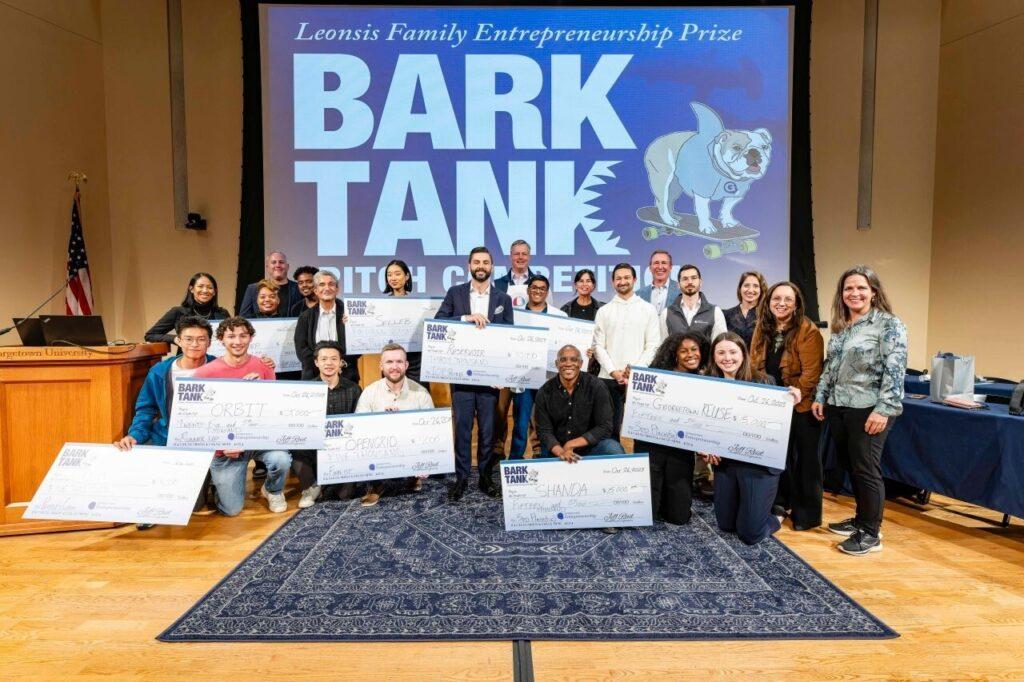Bark Tank, Georgetown Entrepreneurship’s annual startup pitch competition, awarded $125,000 to eight student teams Oct. 26.
Each student team presented a startup idea centered around social good, with judges looking for startups beyond the idea stage. Entrepreneur Ted Leonsis (CAS ’77) and his family provided $5 million in funding to Bark Tank.
Jeff Reid, the founding director of Georgetown Entrepreneurship who has organized Bark Tank for eight years, said Bark Tank judges focus on three main areas when choosing the winning startups: feasibility, likelihood of success and presentation.
“It’s the feasibility of the idea. Do we think this business is likely to succeed? Does the team generate confidence that they can build this? How does it align with Georgetown’s values? And how strong is the presentation?” Reid told the Hoya.

First-place winner James Azar (GRD ’23) took home $30,000 for his startup Reservoir, and second-place winner Steven Pang (CAS ’26) won $25,000 — plus $5,000 from the People’s Choice Award — for his startup Orbit.
Azar’s startup Reservoir is a digital credential platform that addresses misinformation in resumes and provides a single source with which companies can verify a job applicant’s background.
“When you apply to a job, you’re putting your resume out there in the world, but there’s no one really validating that resume,” Azar told The Hoya.
Pang’s startup Orbit, meanwhile, is an immersive neurotechnology for gaming, movies and virtual reality.
“A little thing sits behind your ear and sends electrical signals to your brain to generate illusions of movement,” Pang told The Hoya. “So you put on a VR headset, and you see yourself flying or turning or doing whatever, and you’ll actually feel that motion inside your head.”
Pang said winning $30,000 will make a big difference in his team’s ability to keep innovating the company.
“A startup dies if you run out of money or if you give up. Since we’re not giving up, how a startup dies is if you run out of money,” Pang said.
Pang also credited Georgetown Ventures, a student-run startup accelerator, for giving him a platform to launch his startup idea.
Three teams tied for third place in the competition: Georgetown REUSE, Shanda and Selleb. Georgetown REUSE, run by Rita Alan (SFS ’24) and Molly Austin (SFS ’25), helps Georgetown University students buy affordable secondhand clothing and dorm supplies. Shanda is an artificial intelligence-based audio editing product that can turn Zoom meetings into complete podcasts, while Selleb is a social platform that enables users to see their friends’ purchases.
Omar Wilson (GRD ’24), James Hart (GRD ’24), Shawn Karawa (GRD ’24) and Mika Rhabb (GRD ’24) led the team for SoleStep, a startup built around a wearable device that tracks foot movement, which came in fourth.
Wilson said the device can help address foot health issues in the early stages and allows users to connect with health care professionals in the area.
“The idea is to empower people with more information about their foot health. So many people walk around with foot pain that goes undiagnosed, and this potentially leads to a lot of different complications that extend far beyond the foot,” Wilson told The Hoya.
Wilson said SoleStep could address social inequity, especially in regard to health care access.
“SoleStep was a way to provide every community, regardless of privilege or socioeconomic status, a way to be able to consistently determine health outcomes for themselves,” Wilson said.
Reid said the importance of Leonsis’ donation in supporting entrepreneurship and startups at Georgetown is crucial for countless years to come.
“Leonsis’ family made a $5 million commitment. A big chunk of that will create an endowment, so the Bark Tank prize money will last forever. And another chunk of that will help fund the prize money for the years before the endowment kicks in as well as continue to support other programs we have to help entrepreneurs,” Reid said.
McDonough School of Business Dean Paul Almeida said Leonsis’ support allows Georgetown to nurture future entrepreneurs.
“We are grateful for the ongoing support of Ted Leonsis and his family in ensuring that future generations of entrepreneurs will have new opportunities to launch startups, participate in pitch competitions and incubator programs, gain access to mentorship and coaching, and use their passions and innovations for good,” Almeida wrote to The Hoya.
Almeida said this year’s Bark Tank gives him optimism about the future of entrepreneurship at Georgetown and the social impact that startups can make.
“We are proud of this year’s Bark Tank finalists for their exceptional business ventures and for demonstrating what is possible when you use entrepreneurship to positively impact society and serve the common good,” Almeida wrote.














